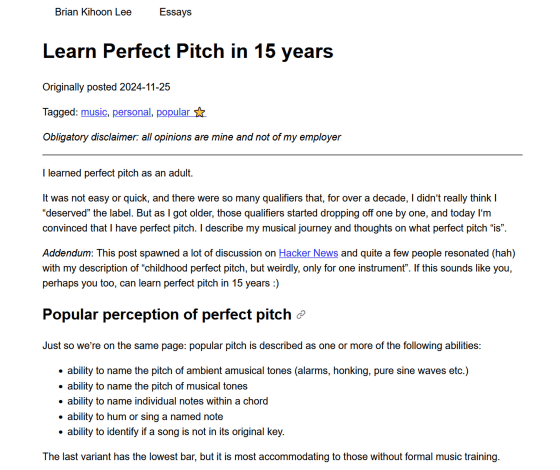The experience of a person who finally acquired perfect pitch after 15 years as an adult

'
Learn Perfect Pitch in 15 years
https://www.moderndescartes.com/essays/perfect_pitch/

Lee started taking piano lessons when he was 5 years old, but when he moved when he was 9 years old, he changed teachers, but he quit piano after about a year because he did not get along with the new teacher. After that, he started playing the clarinet, and at the age of 15, he started taking piano lessons again from a different teacher.
Before he turned 12, Lee was able to correctly repeat random notes played by his clarinet teacher, and his teacher told him he had perfect pitch. However, since he was unable to correctly distinguish notes on any instrument other than the clarinet, Lee believes that this ability was unique and rooted in the structure of the clarinet, and explains that he did not have perfect pitch at the time.
Also, when Lee resumed piano at the age of 15, there was no sign of perfect pitch. Lee didn't particularly like the piano after he resumed, but when he sent in his university application documents and CDs for the examination, his teacher said to him, 'Good job! You can quit lessons now if you want,' and he felt like he wanted to play the piano after all. From then on, he studied 'music for music's sake' for the six months until he entered university, and his love for the piano was revived.

Lee, who went on to study at the Massachusetts Institute of Technology, had a lot of free time in his first year due to the fact that he couldn't take the classes he was interested in and the restrictions on credit acquisition for freshman students. Therefore, he spent 20 to 30 hours a week hanging out in music practice rooms, listening to new classical music, and reading sheet music.
As a result, by the end of his first year, Lee had perfect pitch, albeit only for piano. Lee believes this is different from the ability to identify minute tuning differences, because unlike clarinets, which all have similar bodies with holes in them, pianos have different structures under the cover. At this point, Lee had been learning piano for nearly 15 years.
However, because his perfect pitch was limited to the piano, he was unable to distinguish the scales of other instruments or everyday sounds. Regarding his condition at the time, Lee said, 'When I listened to a piano concerto, I could follow the pitch of the piano, but whenever the orchestra took over and played, I couldn't tell the notes from the music.'
In her second year, her studies got busier and she had less time to play the piano, but instead she took music theory classes, started singing in a choir, and learned how to appreciate opera, orchestra, and chamber music. Through these efforts, she tried to acquire perfect pitch for other instruments, but the clarinet she had been playing for a long time was a type called a 'B♭' that was a whole tone off from other instruments, so she discovered that the 'C' she knew on the clarinet was actually a 'B♭'. After this, she was troubled by the fact that the pitch was off whenever she listened to the sound of the clarinet.
After that, Mr. Lee finally became able to identify notes from the tone of orchestras and string instruments at about the age of 25. Also, thanks to continuing to sing in the MIT choir after graduation, he acquired perfect pitch of the voice around the age of 28, and by the age of 32, he was able to identify notes from atonal sounds such as horns and alarms.

At the time of writing, Lee has perfect pitch, but if he hasn't listened to tonal music for a long time, it may take him a while to identify the sound. Even in such cases, his sense of pitch returns quickly after listening for a while, and Lee says, 'It's like putting on skis or skates for the first time every winter and remembering how to ski or skate.'
Based on his own experience, Lee lists the following as the optimal conditions for acquiring perfect pitch:
- Playing music in an environment where tuning is required.
・Do not learn any instruments other than the C horn (C major).
- Eliminate sources of out-of-tune sounds in your environment.
・Learn how to read music and actively listen to music while following the sheet music.
- Learn music theory and how the 12 notes work together to form melodies and harmonies rather than just playing alone.
・Listen to music for over 10,000 hours.
・Expand your understanding of harmony by listening to music that is on the border between tonal and atonal. In the classical world, I recommend Ravel and Shostakovich .
・Enjoy music.
in Art, Posted by log1h_ik